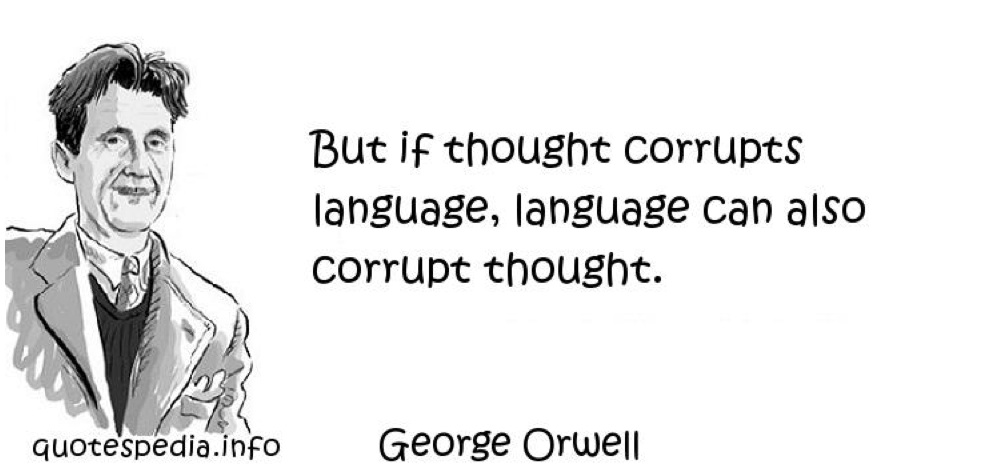April 27th, 2014
The SAT is Changing …. and George Orwell Would be Sad
Hello there! This is my first post in over a year. I reemerge with the double promise of frequency and brevity: I will post once a week, and my posts shall be short! (ish. Short-ish. Errr …. shorter than before.)
If you’re a new reader, here’s the pith: The Book Don’s blog is devoted to powerful books and other writings that bravely and beautifully strive to better our world. I focus on books or essays that have an obvious social, cultural, or political impact. I also post about current events or developments that affect the role of the written word in our society.
The latter brings me to the focus of today’s blog entry. Last month, the College Board announced significant changes to the SAT effective spring 2016, including replacement of the legendary fill-in-the blank vocabulary section that tests knowledge of esoteric words like “pulchritude” and “byzantine” with a new section that will test oft-encountered words like “party” and “synthesis.” The revamped test seeks to be more applicable to skills that a student is likely to actually use during college and in the workforce.
Apparently, it’s not expected that our students will be using a large variety of words during their college years—and the administrators of the SAT seek to ensure that this continues to be the case. The man behind these changes to the SAT is the well-intentioned David Coleman, who played a pivotal role in developing the Common Core State Standards, which are now—controversially—being implemented in 45 states. The Common Core standards are a series of education benchmarks in math and English for K through 12 education. Tests will be administered to assess whether schools and states are reaching these benchmarks.
The lack of public support for the Common Core is best summarized by this New York teacher, who sent this editorial to the New York Times last week after the NYT published multiple articles representing opponents to Common Core as being far-left and far-right fringe groups:
And I must reiterate my disappointment that The Times, the only paper of record as far as I am concerned, totally missed the point: that parents and students and educators are ALL up in arms about the Common Core, not just extremist politicians on both sides, because to us, the Common Core standards are not even standards. They are vague ideas being developed (for huge personal profit) by billionaires and testing companies, imposed upon teachers, students and parents with complete disregard for education, learning and progress.
A sentiment that I agree with. The reason I bring this all up is because the Common Core gets a lot of media coverage (and will be getting more, now that individual states, particularly red states, are opposing its implementation). Opposition to the Core is accessible, if you should choose to peruse the topic. The changes to the SAT are implemented by the same folks behind the Common Core, a fact that’s swimming below the radar.
And these are the folks who don’t believe that vocabulary is important. Or, more specifically, they believe that one’s vocabulary should be molded to the demands of one’s likely future workplace. If you grow up to join the growing brigade of “health care administrators,” then the words you should know include: Data. Input. Demographics. Overpayment. What need have you (says my imagined David Coleman), to know the word “byzantine”?! To which I say: Blimey, you troll bogey!
The rest I leave to George Orwell, who wrote about the ability to consciously shape and mold a language (and the accompanying societal repercussions) in his thoroughly brilliant 1946, essay, “Politics and the English Language.” These are the first two paragraphs. The essay in full should be read here.
Most people who bother with the matter at all would admit that the English language is in a bad way, but it is generally assumed that we cannot by conscious action do anything about it. Our civilization is decadent and our language — so the argument runs — must inevitably share in the general collapse. It follows that any struggle against the abuse of language is a sentimental archaism, like preferring candles to electric light or hansom cabs to aeroplanes. Underneath this lies the half-conscious belief that language is a natural growth and not an instrument which we shape for our own purposes.
Now, it is clear that the decline of a language must ultimately have political and economic causes: it is not due simply to the bad influence of this or that individual writer. But an effect can become a cause, reinforcing the original cause and producing the same effect in an intensified form, and so on indefinitely. A man may take to drink because he feels himself to be a failure, and then fail all the more completely because he drinks. It is rather the same thing that is happening to the English language. It becomes ugly and inaccurate because our thoughts are foolish, but the slovenliness of our language makes it easier for us to have foolish thoughts. The point is that the process is reversible. Modern English, especially written English, is full of bad habits which spread by imitation and which can be avoided if one is willing to take the necessary trouble. If one gets rid of these habits one can think more clearly, and to think clearly is a necessary first step toward political regeneration: so that the fight against bad English is not frivolous and is not the exclusive concern of professional writers.


